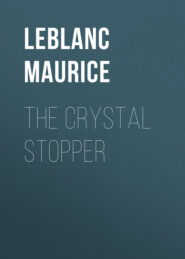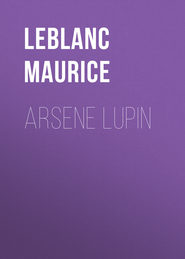По всем вопросам обращайтесь на: info@litportal.ru
(©) 2003-2024.
✖
The Eight Strokes of the Clock
Настройки чтения
Размер шрифта
Высота строк
Поля
"Thank you. I have my reward."
III
THE CASE OF JEAN LOUIS
"Monsieur," continued the young girl, addressing Serge Rénine, "it was while I was spending the Easter holidays at Nice with my father that I made the acquaintance of Jean Louis d'Imbleval...."
Rénine interrupted her:
"Excuse me, mademoiselle, but just now you spoke of this young man as Jean Louis Vaurois."
"That's his name also," she said.
"Has he two names then?"
"I don't know … I don't know anything about it," she said, with some embarrassment, "and that is why, by Hortense's advice, I came to ask for your help."
This conversation was taking place in Rénine's flat on the Boulevard Haussmann, to which Hortense had brought her friend Geneviève Aymard, a slender, pretty little creature with a face over-shadowed by an expression of the greatest melancholy.
"Rénine will be successful, take my word for it, Geneviève. You will, Rénine, won't you?"
"Please tell me the rest of the story, mademoiselle," he said.
Geneviève continued:
"I was already engaged at the time to a man whom I loathe and detest. My father was trying to force me to marry him and is still trying to do so. Jean Louis and I felt the keenest sympathy for each other, a sympathy that soon developed into a profound and passionate affection which, I can assure you, was equally sincere on both sides. On my return to Paris, Jean Louis, who lives in the country with his mother and his aunt, took rooms in our part of the town; and, as I am allowed to go out by myself, we used to see each other daily. I need not tell you that we were engaged to be married. I told my father so. And this is what he said: 'I don't particularly like the fellow. But, whether it's he or another, what I want is that you should get married. So let him come and ask for your hand. If not, you must do as I say.' In the middle of June, Jean Louis went home to arrange matters with his mother and aunt. I received some passionate letters; and then just these few words:
'There are too many obstacles in the way of our happiness. I give up.
I am mad with despair. I love you more than ever. Good-bye and forgive me.'
"Since then, I have received nothing: no reply to my letters and telegrams."
"Perhaps he has fallen in love with somebody else?" asked Rénine. "Or there may be some old connection which he is unable to shake off."
Geneviève shook her head:
"Monsieur, believe me, if our engagement had been broken off for an ordinary reason, I should not have allowed Hortense to trouble you. But it is something quite different, I am absolutely convinced. There's a mystery in Jean Louis' life, or rather an endless number of mysteries which hamper and pursue him. I never saw such distress in a human face; and, from the first moment of our meeting, I was conscious in him of a grief and melancholy which have always persisted, even at times when he was giving himself to our love with the greatest confidence."
"But your impression must have been confirmed by minor details, by things which happened to strike you as peculiar?"
"I don't quite know what to say."
"These two names, for instance?"
"Yes, there was certainly that."
"By what name did he introduce himself to you?"
"Jean Louis d'Imbleval."
"But Jean Louis Vaurois?"
"That's what my father calls him."
"Why?"
"Because that was how he was introduced to my father, at Nice, by a gentleman who knew him. Besides, he carries visiting-cards which describe him under either name."
"Have you never questioned him on this point?"
"Yes, I have, twice. The first time, he said that his aunt's name was Vaurois and his mother's d'Imbleval."
"And the second time?"
"He told me the contrary: he spoke of his mother as Vaurois and of his aunt as d'Imbleval. I pointed this out. He coloured up and I thought it better not to question him any further."
"Does he live far from Paris?"
"Right down in Brittany: at the Manoir d'Elseven, five miles from Carhaix."
Rénine rose and asked the girl, seriously:
"Are you quite certain that he loves you, mademoiselle?"
"I am certain of it and I know too that he represents all my life and all my happiness. He alone can save me. If he can't, then I shall be married in a week's time to a man whom I hate. I have promised my father; and the banns have been published."
"We shall leave for Carhaix, Madame Daniel and I, this evening," said Rénine.
That evening he and Hortense took the train for Brittany. They reached Carhaix at ten o'clock in the morning; and, after lunch, at half past twelve o'clock they stepped into a car borrowed from a leading resident of the district.
"You're looking a little pale, my dear," said Rénine, with a laugh, as they alighted by the gate of the garden at Elseven.
"I'm very fond of Geneviève," she said. "She's the only friend I have. And I'm feeling frightened."
He called her attention to the fact that the central gate was flanked by two wickets bearing the names of Madame d'Imbleval and Madame Vaurois respectively. Each of these wickets opened on a narrow path which ran among the shrubberies of box and aucuba to the left and right of the main avenue. The avenue itself led to an old manor-house, long, low and picturesque, but provided with two clumsily-built, ugly wings, each in a different style of architecture and each forming the destination of one of the side-paths. Madame d'Imbleval evidently lived on the left and Madame Vaurois on the right.
Hortense and Rénine listened. Shrill, hasty voices were disputing inside the house. The sound came through one of the windows of the ground-floor, which was level with the garden and covered throughout its length with red creepers and white roses.
"We can't go any farther," said Hortense. "It would be indiscreet."
"All the more reason," whispered Rénine. "Look here: if we walk straight ahead, we shan't be seen by the people who are quarrelling."
The sounds of conflict were by no means abating; and, when they reached the window next to the front-door, through the roses and creepers they could both see and hear two old ladies shrieking at the tops of their voices and shaking their fists at each other.
The women were standing in the foreground, in a large dining-room where the table was not yet cleared; and at the farther side of the table sat a young man, doubtless Jean Louis himself, smoking his pipe and reading a newspaper, without appearing to trouble about the two old harridans.
One of these, a thin, tall woman, was wearing a purple silk dress; and her hair was dressed in a mass of curls much too yellow for the ravaged face around which they tumbled. The other, who was still thinner, but quite short, was bustling round the room in a cotton dressing-gown and displayed a red, painted face blazing with anger:











